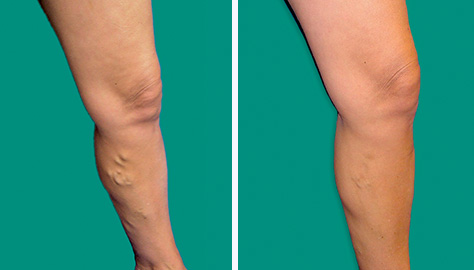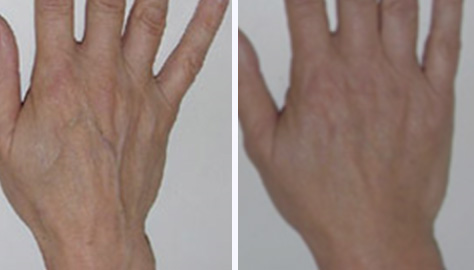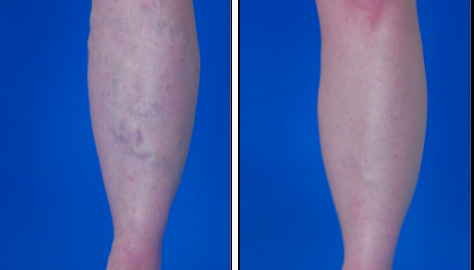TRUE OR FALSE:
VARICOSE VEINS ARE A COSMETIC ISSUE AND DON’T NEED TO BE TREATED.
False: Varicose veins can be treated. Though often thought of as a cosmetic nuisance, varicose veins can sometimes progress to a more serious form of venous disease called chronic venous insufficiency (CVI). CVI is a progressive disease that may result in increasingly serious signs and symptoms if not treated, including leg pain, swelling, restlessness, skin damage and ulcers. Targeted minimally invasive treatment for both varicose veins and CVI now exist. These procedures allow for a short recovery and a quick return to everyday activities while also eliminating varicose veins.
TRUE OR FALSE:
GENETICS AND AGE ARE COMMON FACTORS IN THE DEVELOPMENT OF VARICOSE VEINS AND CVI.
True: Genetics and age are contributors to varicose veins and CVI development. In fact, women older than 50 are most likely to develop venous disease. And, if you have a family member who suffers from varicose veins or signs and symptoms of CVI, you are more likely to develop varicose veins in your lifetime.
TRUE OR FALSE:
COMPRESSION STOCKINGS AND ELEVATION OF THE FEET ARE CURES FOR VARICOSE VEINS.
False: Although compression stockings that provide graduated compression from the ankle up to the knee or thigh help to reduce pain and swelling, they only help to manage symptoms and do not provide a cure. In fact, people with varicose veins may need to continue to wear these stockings for the rest of their lives. Likewise, elevating the feet above the thighs when sitting and above the heart when lying down can help to ease pressure on the veins. However, elevation, like the use of compression stockings, is not a cure for varicose veins.
TRUE OR FALSE:
EXCESS WEIGHT CAN CONTRIBUTE TO VARICOSE VEINS AND CVI.
True: Being overweight is a risk factor to the formation of varicose veins. Regular exercise is recommended to increase blood flow in the legs and maintain a healthy weight to reduce the risk of CVI or varicose veins.
CAN VARICOSE VEINS BE PREVENTED
For mild forms of venous disease, lifestyle changes may be recommended to control existing symptoms and prevent others from showing. The following measures may help prevent varicose veins and reduce symptoms:
TRUE OR FALSE
SPIDER VEINS ARE THE SAME THING AS VARICOSE VEINS.
False: Spider veins, like varicose veins, are caused by dysfunctional vein valves. However, spider veins appear as a nest of blue or red veins just under the surface of the skin and typically do not bulge above the skin’s surface like varicose veins. Varicose veins are a sign of venous disease and should be diagnosed and treated by a vein specialist to avoid progression to CVI. Spider veins are generally regarded as a cosmetic issue.
TRUE OR FALSE:
MEN ARE NOT AT RISK FOR DEVELOPING VARICOSE VEINS AND CVI.
False: Men are at risk for experiencing varicose veins and CVI. In fact, 43 percent of men are expected to develop some form of venous disease by the time they reach their 60s.
TRUE OR FALSE:
STANDING ON YOUR FEET FOR LONG PERIODS OF TIME CAN BE A RISK FACTOR FOR THE DEVELOPMENT OF VARICOSE VEINS.
True: Those spending the entire day on their feet are at higher risk for developing varicose veins. It is recommended that individuals with careers that require prolonged standing, such as restaurant servers, flight attendants, nurses and teachers, rest each day by elevating their feet. Wearing compression stockings can also help modify the risk.
TRUE OR FALSE:
INSUFFICIENT HYDRATION IS SHOWN TO CONTRIBUTE TO VARICOSE VEINS AND CVI.
False: Insufficient hydration should not affect the development of varicose veins. However, trauma or injury to the lower limbs can contribute to signs and symptoms of CVI, including varicose veins. Also, during pregnancy there are hormonal changes and increased pressure on the veins that may contribute to the development of varicose veins in the legs.







Varicose veins are large, bulging veins, as opposed to spider veins, which are thin, branching veins just beneath the skin’s surface.